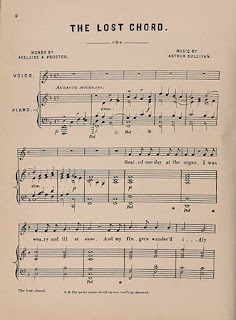I have now finished the book about Arthur Sullivan of Gilbert & Sullivan last noticed at reference 1. A collaboration between the composer's nephew and a professional musical biographer, an easy read, entirely suitable for the moderately interested amateur.
Of both Irish and military stock, with a grandfather who shipped out with Napoleon to St. Helena. A grandfather who had occasion to save Napoleon's heart from rats during an interval in the embalming of his body. A father who became something important in the world of military bands. And who cared enough about his musically precocious son to get him a musical education which he could not really afford.
An education which started out in the Chapel Royal and finished with a scholarship to the conservatoire of Leipzig, founded by Mendelssohn and then a place of some considerable repute. Sullivan then started to make a living composing a variety of music, some of it being performed at the Crystal Palace, then at Sydenham in south London and, inter alia, an important music venue.
In 1867, he took off with George Grove, the inventor of Grove's musical dictionary, to hunt down the lost score of Schubert's Rosamunde, D.797 (Op.26?), part of Grove's effort to promote Schubert in England. A hunt which took them to a music publisher in Vienna and from there to a relative of Schubert's, one Dr. Schneider, with the elusive score finally being hunted down in the back of a dusty cupboard.
Then some years composing more songs and light operas, achieving considerable musical and social success (lots of famous and/or titled friends and acquaintances), with the famous twenty-year partnership with Gilbert starting in 1878 with H.M.S. Pinafore.
An interesting business, with it clearly being important that the librettist, that is to say Gilbert, should as well as knowing his own business, should also have a good understanding of the business of the composer, an understanding which would translate into songs that would set well to music. And a willingness to pull things around a bit to that end.
Sullivan was a hard & fast worker and, reading between the lines, something of a fast liver with a taste for society, socialising and the races. Someone who dashed about composing here, conducting there and meeting a prince somewhere else. The Kaiser, it seems, was very fond of the First Lord's song about polishing the door handle, the one including the line 'And I polished up the handle of the big front door'. Someone who could work through the night, through considerable pain on occasion, and who perhaps wore himself out to die at the relatively young age of 58. Sitting up there on his cloud, perhaps disappointed that he did not come to be remembered better for what he called his serious music; he had wanted to be more than a successful writer of light opera.
Altogether, an interesting read which has earned its place on the shelf, next to the DVD of 'Topsy Turvy'.
PS: Sullivan wrote lots of hymns and other church music, with the one that I know being 'Onward Christian Soldiers'. The only song that I tried, 'The Lost Chord' on YouTube, a tremendous phenomenon in its day, struck me as a very maudlin and sentimental affair - but perhaps that was what the Victorians (up to and including the queen) wanted. Perhaps it also catered to the big market for songs suitable for amateurs at home. A market which Schubert had played to before him. A market which has all but vanished before the onslaught of recorded music.
Reference 1: https://psmv3.blogspot.com/2018/09/falsoid.html.
Reference 2: Sir Arthur Sullivan: his life, letters and diaries - Herbert Sullivan and Norman Flower - 1927.

No comments:
Post a Comment